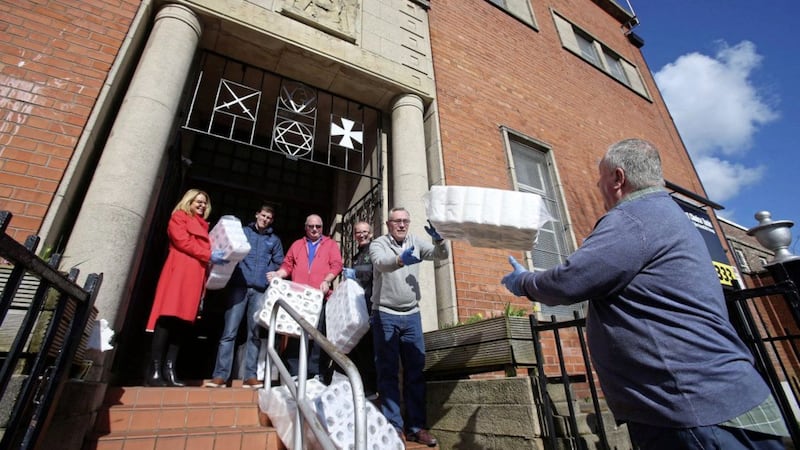Even at this distance Italy’s pain is hard to watch.
All the same, the delight of Italians in music and the power of gestures shines through on balconies throughout the land.
The kind will be kind everywhere and the selfish selfish, but strong civic bonds are readily identifiable and in bad times they hold off some despair. This is harder here, in a place with so fragile a sense of commonality.
Here, hackles quiver if they do not actually rise when encouragement to value ‘Northern Ireland’ is shoehorned into the message. Crumlin Road Masons with their toilet rolls for the Falls helped rescue the mood. Best to focus in close and assume the best of the rest.
This is only Week Two of Crisis Proper. Arlene Foster and Michelle O’Neill might grow into it. After all, a government beaten into the ground at an election a mere six weeks ago has risen to the moment. Acting Taoiseach Leo Varadkar may have little credibility across the class divide but he has shown warmth and dignity. With good speech-writers, determination to show leadership goes a long way.
But Varadkar’s is a state with a shared identity in which people take pride, strong communal bonds. For as long as we here lack all of that, the best we can do is to work with neighbours, inside families, streets and townlands.
And let’s tone down the attacks on specific politicians. Unless what they voice is plain ugly. (Yes, this writer will try to be consistent.) In a disaster with no detectable end-point, constant blame is not useful, or comforting. Anger at dithering education minister Peter Weir, even at Boris Johnson and his advisers, is wasted energy. Demanding action is different: testing and more testing; continuing, widespread; more personal protective equipment, PPE, for the nurses and doctors who after hard shifts, as some attest, carry infection home if they are not properly equipped.
The Troubles were one long catastrophe for individuals, groups, whole communities. Saying ‘we got through it’, as some have begun to chant to anyone younger who will listen, is a fib. The dead did not get through it, nor the bereaved and badly, lastingly-injured. Some survived better than others - with less visible, obvious damage. Some barely survived, and the scale of mental and spiritual injury is still nowhere near adequately reckoned. If psychologists are right about inherited trauma, passed through generations, there will be another reckoning eventually.
The public voices here that kept people going were those that had hope in them, uplift. John Hume did it for many, Des Wilson for some.
The very sound of voices influenced mood. As in much else, northern Protestants were badly served. One instantly recognisable and powerful voice was devoted to scaring his people. It may have been the worst of Ian Paisley’s sins.
The fortnight-long loyalist workers strike in 1974 terrified Catholics and deluded some Protestants. The strikers controlled the power stations; light, heat, water supplies. Almost hourly, and from very early in the strike, official spokesman for the Electricity Service Hugo Patterson announced on the BBC that the situation would soon be past recovery. Or past the ‘Point of No Return’, a declaration that Bob Fisk used as title for a book well worth re-reading.
An agriculture correspondent and several reporters added melodrama and near-hysterics. Though Fisk was sure the strikers never intended to wreck their own system, in his estimate and that of many listeners those broadcasts helped to crash power-sharing Stormont. A ‘sincere, middle-aged man’, Fisk called Patterson. The message people heard was that power would be switched off unless power-sharing ended.
Hume, the commerce minister, wanted Patterson off the air but the BBC and Labour government said that would be censorship. If it didn’t sound like the same thing, there might be an argument now for shutting down social media, where people are cruel far more often than they are kind, or sensible.








